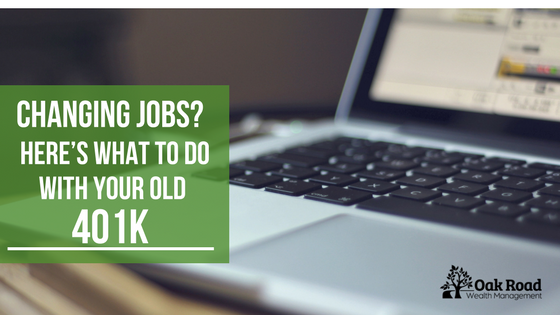Changing jobs can be exciting, stressful and sometimes unexpected. And with the change you’ll have a lot to think about. What is the new work environment going to be like? You’ll be forming new work relationships, you might have new travel expectations, you’ll need to sign up for benefits, etc. Amid all of the new things in your life, don’t forget about the old. As in your old 401k. You’ll need to make a decision on what to do with it and you have several options.
Here are your 4 choices — including the pros and cons of each decision.
Leave it where it is
In many cases, you have the option to leave your money in your old company’s 401k plan. Some employers won’t allow this at all and others have a minimum balance requirement in order for you to keep your money there.
Pros:
- Familiarity with the website, investment options, etc.
- May offer competitive pricing compared to your other options.
- You may be able to make penalty free withdrawals if you leave your job or retire at 55 or older.
- Unless it’s a Roth 401k, your money will continue to grow tax deferred.
Cons:
- If you change jobs multiple times you may have several old 401ks that are hard to keep track of. It may also be hard to implement your investment strategy and keep the proper asset allocation when you have money at several locations with differing investment options.
- You may not experience good service — or at the very least, the service you receive will be reactive. Ideally, when you work for a company you have a dedicated team that visits the office regularly to help educate you about the plan and helps you with financial planning.
- You may be limited to the small universe of investment options the plan has available.
- Your distribution options may be limited, the plan may require you to take out everything or nothing.
Rollover to new 401k
In most cases you can rollover your old 401k into your new 401k.
Pros:
- If you keep all of your retirement money together it will be easier to manage.
- May offer competitive pricing compared to your other options.
- You may be able to make penalty free withdrawals if you leave your job or retire at 55 or older.
- Unless it’s a Roth 401k, your money will continue to grow tax deferred.
- If you’re still working, you may be able to defer your Required Minimum Distributions beyond age 70 ½.
Cons:
- You may be limited to the small universe of investment options the plan has available.
- You won’t have as much control over investment options, costs, and your financial advisor as you would if you did a rollover into an IRA.
Move it to an IRA
You can open an IRA account at a bank, brokerage or with an investment advisor. You may even be able to ‘rollover’ your money into an existing IRA that you already have. Make sure you have a good understanding of what the fees will be like if you rollover to an IRA. In many cases you need to be aware of the ‘advisory’ fees charged by the Investment Advisor in addition to non-transparent fees that may be present as well.
Pros:
- Your money will continue to grow tax deferred.
- You should have a dedicated financial advisor.
- You have access to a wider variety of investment options.
- You have the ability to convert some of your dollars to a Roth IRA.
- If you change jobs multiple times, your IRA can be the centralized location where you move all of your retirement money to the same place.
- The services offered by your dedicated financial advisor are more likely to include 1 on 1 comprehensive financial planning.
Cons:
- With a dedicated financial advisor, there is potentially more cost.
- You may not have the ability to take money out penalty free when you are between the ages of 55 and 59 1/2.
- You won’t be able to defer your Required Minimum Distribution beyond age 70 ½ if you’re still working.
Cash it out
Pros:
- There aren’t many pros to cashing out your old 401k. Even if you’re 55 and retiring or 59 ½, there will still be taxes due on the entire balance.
Cons:
- Traditional 401k dollars have not been taxed, and neither has the growth. Withdrawals will be subject to Federal and State taxes at your current tax rate. Keep in mind, distributions are considered income and will increase your taxable income for the year which could affect your tax bracket. Assuming the cash-out is prior to the rule of 55 or 59 ½, you may be subject to a 10% IRS penalty in addition to taxes due. Don’t ever cash out a 401k without first discussing it with a financial advisor or CPA so you understand the implications.
At Oak Road Wealth Management, we can help you consider your options for your old 401k. Full disclosure, Oak Road is incentivized if you choose to rollover your 401k into an IRA with our firm. That being said, we will objectively help you choose between all of your options. In some cases, especially when the individual is between age 55 and 59 ½ and thinking about early retirement, it may make more sense to keep some or all of your money in your 401k.
Want to learn more? Let’s grab a coffee and talk about your options.

